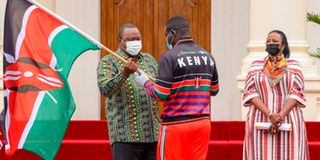Let’s fully back Team Kenya for Tokyo Olympics

President Uhuru Kenyatta, flanked by Sports Cabinet Secretary Amina Mohamed, hands over the Kenyan flag to national Sevens rugby team captain Andrew Omonde at State House, Nairobi ahead of Team Kenya's departure to the 2020 Tokyo Olympic Games.
What you need to know:
- At least 11,000 athletes from 206 countries are expected at the Olympics, besides thousands of fans, support teams and hospitality staff.
- The athletes and the support crews face the threat of catching Covid-19 in this high-risk environment
The Olympic games are geared to begin in Tokyo in a couple of weeks. And it has become evident that rules as regards athlete participation are not applied equally. One key example is the refusal for Olympian swimmers to wear swimming caps designed to accommodate the voluminous curls common to African and African-descended peoples. The International Swimming Federation said the caps “do not follow the natural form of the head”. This racist statement met massive uproar and is currently under review.
Testing women athletes for ‘naturally high testosterone levels’ is another key issue. Male athletes with naturally higher testosterone than fellow men compete without question or comment. For them, it is considered a natural advantage, like long arms, flexible joints or extra height. Why should it be viewed any differently for women?
Secondly, research shows the effects of testosterone on performance in sports are mixed and non-linear, as stated in a 2019 article titled ‘Four myths about testosterone’ in the Scientific American.
Hormone levels differ as much from person to person as they do from sport to sport. As such, any claim that naturally high testosterone automatically results in better performance, even among men, is untrue. As a country that is globally famed for its athletic prowess, support for our own and all black athletes begins with pushing back against these unverifiable claims. Keeping quiet in a scenario like this is akin to complicity.
Superspreaders of coronavirus
The second thing we must ensure is the holistic health of our athletes. Public health experts caution that until the worst of the pandemic is over, it is unwise to hold mass events, which could turn out to be superspreaders of coronavirus.
At least 11,000 athletes from 206 countries are expected at the Olympics, besides thousands of fans, support teams and hospitality staff.
The athletes and the support crews face the threat of catching Covid-19 in this high-risk environment, and with the debilitating effects of both the disease and its longer-term effects, the possibility of a halted or changed career.
It is hoped that efforts are being made to ensure the athletes keep in touch with each other to boost morale, and that they can access mental health care. It is, therefore, a great relief to hear the strict rules being enforced in Tokyo (three-day quarantine upon arrival, prohibition of socialising and group meals, solo eating, daily testing, no talking in confined spaces like elevators and cars, mask wearing and leaving within 48 hours after last event, among many others).
Finally, Kenyan athletes should not lack basics such as food, shelter or care. They are quite neglected during training and qualifiers, and it would be too much for them to be subjected to global shame when exerting themselves for the country’s glory.
It is also crucial to ensure Kenya’s hand is felt wherever there is need to address emergency needs of others. For, if the objective of the Olympics is global harmony, our reputation for flawless hospitality must first be felt in full by our own and others, both at home and away.
The writer is a policy analyst; [email protected]





